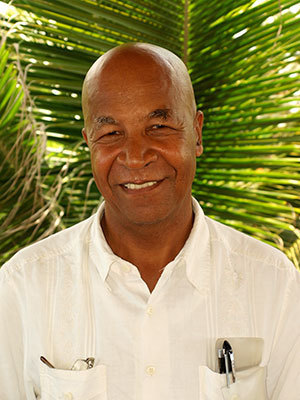 Ricardo Esquivia
Ricardo Esquivia
Ricardo Esquivia, a Colombian Mennonite who has dedicated his life to building peace in Colombia, will discuss peace, justice and human rights at the 15th Annual Yoder Dialogues on Nonviolence, Religion and Peace at the University of Notre Dame’s Kroc Institute for International Peace Studies.
Sponsored by the Kroc Institute, the talk, titled “Building Just Peace in Colombia,” will take place at 11 a.m. Oct. 3 (Thursday) in the Hesburgh Center for International Studies Auditorium.
Trained as a human rights lawyer, Esquivia has decades of experience working with local churches and communities in Colombia, a country with one of the longest-running civil wars in the western hemisphere.
The son of an Afro-Colombian father and an indigenous mother, Esquivia was raised on the Caribbean coast of Colombia. When his father developed leprosy and was institutionalized, young Esquivia received services and education from the Mennonite church and community, which deeply influenced his faith and commitment to nonviolent change.
In 1990, Esquivia founded JustaPaz, the Colombian Mennonite Ministry for Justice, Peace and Nonviolent Action, which he directed for 13 years. More recently, on the Caribbean Coast, he founded Sembrandopaz (Planting Peace), a regional interdenominational organization that works with displaced communities in the process of returning to their land and seeking reparation.
The Yoder Dialogues, established in 1999 by the Kroc Institute for International Peace Studies, are named in honor of John Howard Yoder, professor of theology at Notre Dame from 1968 until his death in 1997. They were established through a gift to the Kroc Institute from Anne Marie Yoder, widow of John Howard Yoder, and with ongoing support from the Yoder family.
Yoder’s teaching and scholarship profoundly influenced theological discussions about war, social justice and the relationship between church and state. He was a founding fellow of the Kroc Institute, where he initiated courses on war, law and ethics, and nonviolence. His books include “The Priestly Kingdom,” “What Would You Do?”and “The Politics of Jesus.”
Each year, the Kroc Institute invites a leading thinker, writer, scholar and/or peace advocate to deliver a lecture related to nonviolence, religion and peace.
This event is free and open to the public. Esquivia’s remarks will be translated from Spanish.
Following the lecture, audience members are invited to join in informal dialogue and discussion with Esquivia and with each other.
Contact: Joan Fallon, 574-631-8819, jfallon2@nd.edu